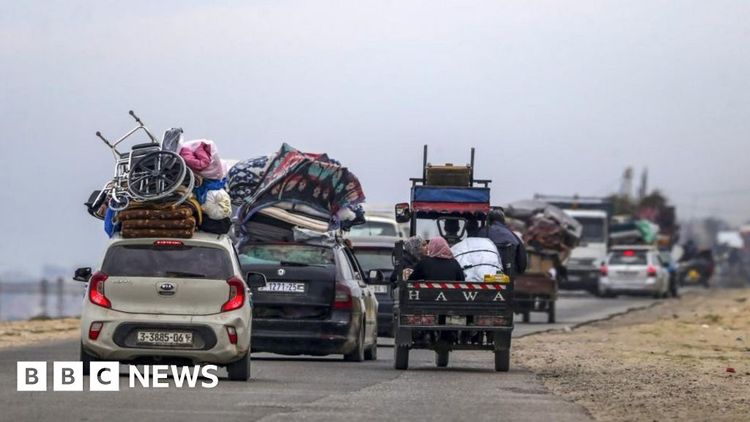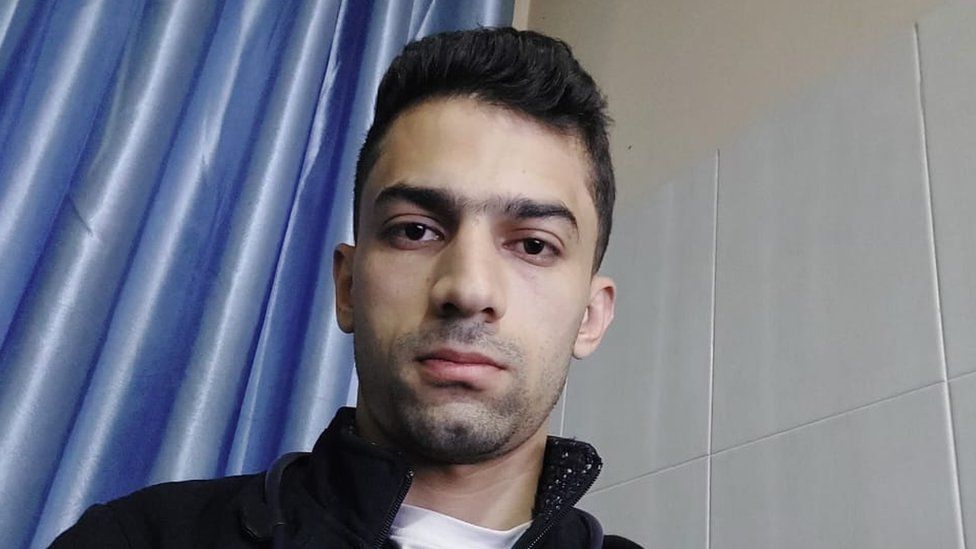Palestinians sheltering in Rafah fear impending Israeli ground offensive

The photograph was taken by Dr. Ahmed Abuibaid
Written by Adam Durbin and Alys Davies
A doctor from Palestine residing in the city of Rafah has expressed great concern about the possibility of an attack by the Israeli army in the southern region of Gaza. He claims that the people living there are extremely frightened as they experienced severe bombing last night, worse than anything he has witnessed since moving to the area.

Dr. Ahmed Abuibaid sent multiple messages to the BBC via phone during the night, describing the airstrikes as continuous and occurring in various locations.
The inquiry that is on everyone's thoughts presently is, what are the destinations available to us?" he expressed.
Over half of the 2.3 million inhabitants of Gaza are currently living in the city near the border with Egypt. This area, which used to have a population of only 250,000 before the conflict between Israel and Hamas, is now packed with people.
A lot of individuals who have been forced to leave their homes are currently residing in rough, improvised homes or camping tents under extremely unsanitary conditions. They have limited opportunities to obtain access to clean and safe drinking water and sustenance.
Last Monday, Volker Türk, the chief of human rights in the UN, cautioned that if Rafah is attacked, it would result in a frightful outcome as many civilians, majorly women and children, would likely lose their lives or sustain injuries.
He also mentioned that there's a possibility that the limited humanitarian assistance currently reaching Gaza might come to a halt. The majority of these deliveries currently pass through the Rafah border crossing, which is controlled by Egypt.
He cautioned after the United States expressed strong condemnation last week, when President Joe Biden described Israel's response in Gaza as excessive and the White House made it clear that Israel must make sure innocent civilians are not affected before launching a campaign in Rafah.
It's possible that the presentation you are trying to view may not be compatible with your device.
The views expressed by the chief of foreign policy for the EU, Josep Borrell, align with those of others who have called for an end to the supply of weapons by Israel's allies. Borrell made these remarks on Monday, emphasizing that numerous people in Gaza are being killed.
Lord Cameron, who holds the position of UK Foreign Secretary, has advised Israel to carefully consider its actions before making any further moves in Rafah.
Mr Netanyahu was interviewed by ABC News on Sunday and stated that Israel is developing a comprehensive strategy to transport inhabitants to regions situated in the northern part of the city.
He stated that achieving success is almost possible. People who are against entering Rafah are essentially implying that we should let Hamas remain and lose the war.
On 7 October, Hamas militants killed over 1,200 individuals in the southern region of Israel and held 253 others captive. Consequently, the Israeli military commenced an extensive operation involving both air and ground attacks on Gaza.
According to the health ministry in Gaza, which is controlled by Hamas, the number of Palestinians who have lost their lives in the conflict has surpassed 28,100.
The blog post's featured photo is credited to Dr. Ahmed Abuibaid.
According to Dr Abuibaid, an Israeli airstrike created a crater in Rafah, and he captured a photo of it.
A person from Rafah named Dr Abuibaid had to leave his work at Nasser Hospital in the city of Khan Younis. This happened because his house was destroyed in an Israeli strike, and his father got a significant back injury. As a result, he became displaced.
Currently, he may need to relocate from Rafah, but it remains uncertain where he can find a secure place to stay.
He stated that individuals are extremely anxious about the likelihood of a potential ground offensive occurring in the urban area.
The Israeli military conducted airstrikes during a mission to save two Israeli captives which happened overnight from Sunday to Monday. The airstrikes caused fear and panic among the other people who have taken shelter in the city.
Mr. Abo Mohamed Attya shared that he and his family were sleeping in a temporary shelter when he was suddenly awoken by the sound of an attack.
Out of nowhere, there were explosions from rockets and they were being shot in all directions. Airplanes were also flying overhead and all of this chaos was happening around the tents and the individuals on the streets, he conveyed to the BBC.
Mr Attya, who had fled from Nuseirat refugee camp located in the Gaza Strip due to Israeli evacuation orders, expressed his discontent over the lack of notice provided by the Israeli military regarding their plan to strike Rafah during the night.
"We were hoping for a prior notice to evacuate, just like they did in Nuseirat. So, we headed towards Rafah and were ready to leave for any location they directed us to. Our motive was to ensure the safety of our children. Leaving was not an issue for us," he stated.
According to Jeremy Bowen, a journalist at BBC, Rafah is the next area of concentration for Israel's military, and this could have significant implications.
According to the Palestinian health ministry, which is controlled by Hamas, at minimum 67 individuals lost their lives in the raids and mission to free hostages conducted by Israel in Rafah during the night.
Mr. Attya expressed that there is no longer any secure location. Every place, including hospitals, is now hazardous. He even went as far as saying that he would rather pass away than risk his safety.
Apart from the constant danger of Israeli aerial assaults and an imminent attack by their troops, the inhabitants of Rafah are facing a serious predicament due to poor living standards, which entails limited availability of water, food, and sanitation, and a significant decline in their medical stocks.
According to Dr. Abuibaid, he has noticed a significant rise in illnesses among the individuals residing in Rafah. Moreover, the scarcity of medicine and treatment has aggravated these diseases even more.
A different health worker from Rafah, who preferred not to disclose their identity, informed the BBC that a considerable number of individuals were residing in small and unclean environments.
I reside in this place with a group of 20 individuals, all huddled up in just a couple of rooms... I'm aware of others who actually have to accommodate 100 folks within three rooms.
He mentioned that we are unable to wash due to the absence of water, we do not possess any garments and we are not capable of carrying out cleanliness practices.
"Every person I encounter, including my friends, seem to be suffering from various illnesses such as the flu, cholera, diarrhea, scabies, and the newly emerging hepatitis A. Unfortunately, the situation appears to be deteriorating."
He expressed that the assistance is dwindling as the blockade intensifies and the fight is escalating, with [Israeli troops] moving nearer to Rafah, resulting in a very fearful atmosphere presently.
Despite being situated adjacent to the solitary checkpoint for commodities and individuals between Gaza and Egypt, the region of Rafah has not obtained adequate assistance to fulfill the requirements of its inhabitants.
A city resident informed the BBC that individuals were experiencing long waits for assistance, and even when help arrived, there was a shortage of adequate water supplies.
Another woman in Rafah mentioned that they are facing an acute water crisis. They aren't able to locate any source of water, and even if they do, it's not sufficient for their needs. This scarcity of water has led to their throats becoming parched.
On Monday, the leader of the biggest humanitarian group in Gaza, UNRWA, expressed concern about the situation in the region. The civil order appears to be falling apart, with members of the local police force operated by Hamas either being killed or unwilling to safeguard aid lorries due to their own safety worries.
Yesterday was the first time that the UN was unable to function with the basic level of security provided by the local police. Due to the absence of local police, numerous young people were able to loot our trucks and vandalize our convoys at the border.
'No Clue' Where To Travel
However, for a portion of those who have been forced to leave their homes, their worries about what may happen in the future are even more significant than their daily concerns about locating safe drinking water and nourishment.
"We used to worry about not having enough food, running out of water, and losing electricity. However, our current concern is much more distressing: What should we do next? Where can we go? This is the reality of our everyday life," shared Ibrahim Isbaita in an interview with the BBC.
When Mr. Isbaita was questioned about where he and his family would go if they were forced to leave Rafah, he stated that he had absolutely no clue.
He mentioned that his mom requires dialysis for her medical condition. Currently, she can undergo the procedure in Rafah but only when there's electricity available. Unfortunately, it's not as often as required. The dilemma lies in the fact that if they relocate, finding proper treatment elsewhere may not be likely.
Mr. Isbaita mentioned that he resides close to the hospital due to his mother's situation, and they are actively searching for a resolution to their circumstances.







































